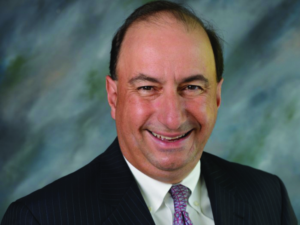 3 min read December 2022 — Peter Dontas, executive vice president of Wells Fargo, talked to Invest: about why New Jersey is an amazing location to do business, Wells Fargo’s involvement in community work and how the banking industry is transforming due to technological advancements.
3 min read December 2022 — Peter Dontas, executive vice president of Wells Fargo, talked to Invest: about why New Jersey is an amazing location to do business, Wells Fargo’s involvement in community work and how the banking industry is transforming due to technological advancements.
What have been some of the biggest achievements and highlights for Wells Fargo over the past year?
Given our unique position between New York City and Philadelphia, New Jersey is one of the leading markets for our company as measured by the number of clients and our operations within the market. Over the past year, we continued to grow our commercial banking division in the state by landing new clients, expanding our work with our existing customers, and adding to our team, which now includes five regional offices and over 50 employees that serve companies with $10 million to $2 billion in annual revenue. As a team, we support our customers with their lending, treasury management, depository, foreign exchange, and capital markets needs throughout the state. We also have expertise and services tailored for specific industries, including beverage, food and agribusiness, technology, healthcare, government, higher education, clean technology, and environmental services. And despite inflation and rising interest rates, we found that the commercial lending market has remained competitive. We grew our overall business more than in any of the last five years.
What are customers looking for when they walk through your door?
Our job is to help clients succeed financially, whether it’s a longtime client or a prospective customer. At Wells Fargo, we view our customer relationships as long-term, and can provide support and guidance through various market cycles and phases of your business. We aim to understand their strategy, what they are looking to do in terms of growth, whether they looking to buy or sell, and come up with solutions specific to their needs and business goals. Similarly, whether it be lending, going into capital markets, fraud protection or working with clients on their day-to-day financial needs, we thoughtfully create and plan custom strategies for every situation.
With the influx of people within the region, what is the banking sector’s position in responsible growth of the region?
As far as responsible growth is concerned, we are always looking at business opportunities from a risk management mindset and a strategic growth perspective. My team has deep understanding of the major players in the state, what their growth plans are, and how they can be leveraged for mutual benefit. Today, many companies are gravitating toward the North Jersey market because of its proximity to New York City and its talented and educated employee base. While it is expensive to live and work here, it is offset by the talent that we have in this market.
How is Wells Fargo addressing the labor shortage and what makes for a good work culture?
During the height of the pandemic, we were working from home for almost two years. Now, we’re back in the office on a hybrid schedule. Even on days when you’re working remotely, we realized we remained productive . The key to making an environment where people want to stay and work is flexibility, especially since people have become used to a different tempo and commuting schedule post-COVID.
Given the focus on community development by Wells Fargo, why is it important for you to see the community active and engaged?
I have worked in the New Jersey market for the past 30 years and we support many causes that align with our company-wide community support priorities, such as financial health, housing affordability, small business growth, and sustainability and environmental justice. We provide grants to nonprofit organizations working to strengthen the resiliency of our communities and our planet. Priority is placed on nonprofit programming supporting low- to moderate-income communities, addressing racial and social equity, and accelerating an inclusive economy. I believe it’s important to be visible in these areas and give back to the communities where we live, work and do business.
What is the biggest challenge that Wells Fargo is facing and how does that relate to the wider banking industry?
The biggest challenge is reinventing the banking business for a new era. Just 10 or 15 years ago, you wrote a check to pay your bills, or, you went to the branch and took out the money that you needed for a week. Basically, everything was more of a manual process. Today, this is completely archaic as you have electronic payment opportunities.
Companies are transitioning in the way they conduct their business, as well as moving from paper to digital and electronic. It is not unusual anymore for companies to pay large sums to their vendors using credit cards instead of checks or wires. There are also certain incentives for paying with credit cards as there are rewards in terms of points. Thus, it is important for us to invest in technology to make this possible. For example, given the size of our operations, it makes sense that we can afford to make those significant investments in making sure that our technology is always upgraded and state-of-the-art. Lastly, one of the major challenges is fraud protection where people with ill intentions come into your system and try to move money around and this happens a lot more often than you think, so there are ways of having products and systems that protect both us and the customer from that happening.
For more information, visit:
